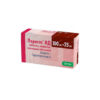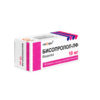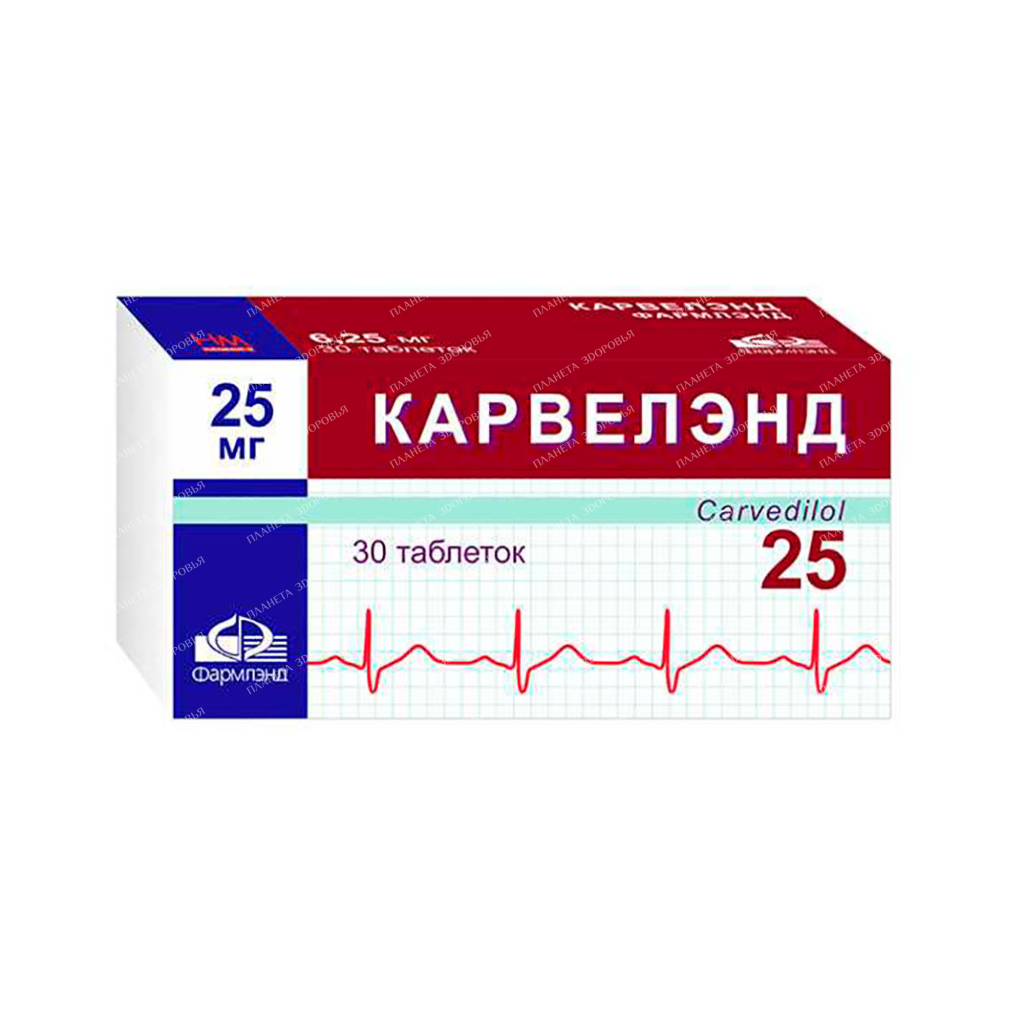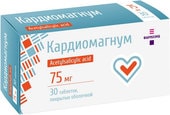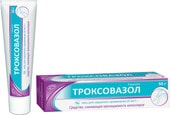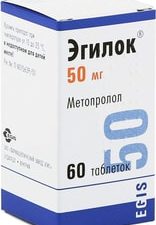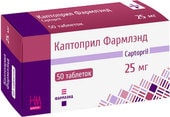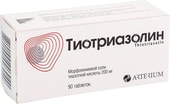Carveland Tablets 25mg: Effective Treatment for Hypertension, Angina, and Heart Failure
Carveland Tablets 25mg are a reliable and effective treatment option for a range of cardiovascular conditions. This medication contains the active ingredient carvedilol, a potent alpha- and beta-blocker, offering comprehensive management for essential hypertension (mild to moderate), chronic angina, and stable chronic heart failure.
Key Features:
- Dosage: 25mg
- Quantity: 30 tablets per pack
- Manufacturer: Pharmlend sp LLC
- INN: Carvedilol
How Carveland Works:
Carveland Tablets act by:
- Expanding peripheral vessels: This reduces resistance, lowering blood pressure.
- Moderating heart rate: It reduces conductivity and strength, resulting in a slower heart rate.
Who Can Benefit:
Carveland Tablets are indicated for individuals suffering from:
- Essential hypertension: High blood pressure.
- Chronic angina: Chest pain caused by insufficient blood flow to the heart.
- Stable chronic heart failure: A condition where the heart is unable to pump blood efficiently.
Important Considerations:
Contraindications:
Carveland Tablets are not suitable for everyone. Consult your doctor if you have any of the following conditions:
- Hypersensitivity to carvedilol or any excipients.
- Chronic heart failure in the decompensated stage.
- Chronic obstructive respiratory disease or bronchial asthma.
- Allergic rhinitis, laryngeal edema.
- Pulmonary heart.
- Sick sinus syndrome.
- Atrioventricular (AV) block II and III degree.
- Severe hypotension.
- Severe bradycardia.
- Cardiogenic shock.
- Myocardial infarction with complications.
- Clinical manifestation of liver failure.
- Metabolic acidosis.
- Simultaneous use of MAO inhibitors.
- Established slow metabolism of debrisoquine and mephenytoin.
- Lactation.
- Age under 18 years.
- Fructose or galactose intolerance, Lapp lactase deficiency, malabsorption of glucose-galactose or sucrose-isomaltose.
Concomitant Diseases:
Consult your doctor if you have any of the following conditions before starting Carveland Tablets:
- Chronic bronchitis, heart failure, emphysema.
- Prinzmetal’s angina, diabetes mellitus, hypoglycemia, thyrotoxicosis.
- Peripheral vascular disease, pheochromocytoma, depression.
- Myasthenia gravis, psoriasis, renal failure.
- Before any surgical procedures or desensitization course.
Drug Interactions:
Inform your doctor if you are currently taking any medications, as Carveland Tablets may interact with certain drugs, potentially requiring dosage adjustments or additional monitoring.
Pregnancy and Lactation:
Carveland Tablets are not recommended during pregnancy and are contraindicated during breastfeeding. Consult your doctor for guidance in emergency situations.
Driving and Operating Machinery:
Carveland Tablets may cause dizziness and lethargy. Avoid driving, operating machinery, or engaging in tasks requiring focus, especially at the beginning of treatment or when adjusting doses.
Dosage and Administration:
- Dosage: The dosage of Carveland Tablets will be determined by your doctor based on your condition and individual needs.
- Administration: Take Carveland Tablets with meals, starting with a small dose and gradually increasing it until the desired effect is achieved.
Adverse Reactions:
While Carveland Tablets are generally safe and effective, some individuals may experience side effects. Common side effects include dizziness, headache, progression of heart failure, arterial hypotension, asthenia, and fatigue.
Precautions:
- Cardiovascular Conditions: Be cautious with unstable or secondary hypertension, unstable angina, complete interventricular blockade, the final stage of peripheral arterial circulatory disorders, fresh myocardial infarction, and a tendency to lower blood pressure.
- Respiratory Conditions: Individuals with chronic bronchitis or emphysema should avoid Carveland Tablets.
- Diabetes: Carveland Tablets may mask or reduce the symptoms of hypoglycemia.
- Peripheral Vascular Disease: Carveland Tablets may increase symptoms of arterial insufficiency.
- Thyrotoxicosis: Carveland Tablets may reduce the symptoms of thyrotoxicosis.
- General Anesthesia and Major Surgery: Inform your anesthetist about taking Carveland Tablets before any surgical interventions.
- Bradycardia: Carveland Tablets can cause a decrease in heart rate.
- Hypotension: Carveland Tablets can cause a decrease in blood pressure.
- Increased Sensitivity: Use caution if you have a history of severe hypersensitivity reactions or are undergoing desensitization.
- Severe Adverse Skin Reactions: Avoid Carveland Tablets if you have previously experienced severe adverse skin reactions.
- Psoriasis: Use with caution under the guidance of your doctor.
- Simultaneous Blockers of “Slow” Calcium Channels: Monitor ECG and blood pressure closely if taking verapamil, diltiazem, or other antiarrhythmic drugs.
- Pheochromocytoma: Use with caution if you have pheochromocytoma or suspected pheochromocytoma.
- Prinzmetal’s Angina: Use with caution due to the possible occurrence of pain.
- Intraoperative Syndrome of Atonic Iris: Inform your surgeon about taking Carveland Tablets if cataract surgery is necessary.
- Contact Lenses: Carveland Tablets may decrease tear production.
- Liver Damage: Undesirable liver reactions are possible but usually reversible.
Storage:
Store Carveland Tablets in a cool, dry place, away from light and heat. Keep out of the reach of children.
Disposal:
Dispose of unused or expired medications responsibly. Do not flush them down the toilet or throw them in the trash. Consult your pharmacist for proper disposal guidelines.
Availability:
Carveland Tablets are available by prescription only.
Buy Carveland Tablets 25mg No. 10×3:
Consult your doctor to determine if Carveland Tablets are right for you and to obtain a prescription.
Disclaimer:
This information is for general knowledge and does not substitute for professional medical advice. Always consult with your doctor for diagnosis and treatment recommendations.
| INN | CARVEDILOL |
|---|---|
| The code | 129 644 |
| Barcode | 4 810 368 013 279 |
| Dosage | 25mg |
| Active substance | Carvedilol |
| Manufacturer | Pharmland SP LLC, Belarus |
Related products
Cardiovascular Health
 Free worldwide shipping on orders $99+
Free worldwide shipping on orders $99+  US: temporary delays — postal services aligning new import rules,
US: temporary delays — postal services aligning new import rules,  EU: 1–2 weeks,
EU: 1–2 weeks,  Worldwide: 1–4 weeks
Worldwide: 1–4 weeks 

